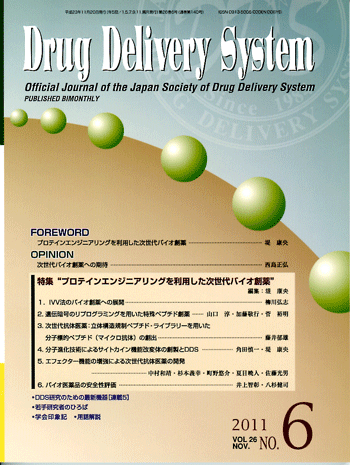All issues

Volume 26 (2011)
- Issue 6 Pages 571-
- Issue 5 Pages 450-
- Issue 4 Pages 366-
- Issue 2 Pages 88-
- Issue 1 Pages 10-
Volume 26, Issue 6
Displaying 1-6 of 6 articles from this issue
- |<
- <
- 1
- >
- >|
Feature articles “Protein engineering technology for next-generation biodrug development” Editor : Yasuo Tsutsumi
-
Hiroshi Yanagawa2011Volume 26Issue 6 Pages 571-583
Published: November 30, 2011
Released on J-STAGE: February 29, 2012
JOURNAL FREE ACCESSWe have originally developed the so-called in vitro virus (IVV) method as a more stable and efficient tool for analyzing protein functions. The IVV method is applicable for analyzing and screening protein-protein interactions, transcription factors, RNA binding proteins, bioactive peptides, drug-target proteins, and antibodies using protein, DNA, RNA, drug and antigen as baits, and a randomly primed cDNA library. We further developed a large-scale and high-throughput IVV screening system utilizing a biorobot and microfludic chip.View full abstractDownload PDF (1775K) -
Atsushi Yamaguchi, Takayuki Katoh, Hiroaki Suga2011Volume 26Issue 6 Pages 584-592
Published: November 30, 2011
Released on J-STAGE: February 29, 2012
JOURNAL FREE ACCESSThis review discusses recent development of a new platform technology that enables us to discover "natural product-like" non-standard peptides against various therapeutic targets. This platform technology is referred to as RaPID system (Random non-standard Peptides Integrated Discovery) system, composed of FIT (Flexible In-vitro Translation) system coupled with an mRNA display. By means of this system, a library of macrocyclic peptides consisting of over trillion unique sequences could be constructed and rapidly screened for desired bioactive properties. We shall also discuss the importance of merging the non-standard peptide therapeutics with DDS as a perspective.View full abstractDownload PDF (994K) -
Ikuo Fujii2011Volume 26Issue 6 Pages 593-603
Published: November 30, 2011
Released on J-STAGE: February 29, 2012
JOURNAL FREE ACCESSWToday, antibodies are indisputably the most successful reagents in molecular targeting therapy. However, use of antibodies has been limited due to the biophysical properties and the cost to manufacture.To enable new applications where antibodies show some limitations, we have developed an alternative-binding molecule with non-immunoglobulin domain. The molecule is a helix-loop-helix peptide, MicroAntibody", which is stable against natural enzymes in vivo and is too small to be non-immunogenic. We constructed a phage-displayed library of MicroAntibodies. and screened the library for cytokine receptors. The obtained MicroAntibodies showed high affinity (Kd of nM range) and enzyme-resistant properties. The semi-rational strategy, which combines phage-displayed libraries with de novo designed peptides, provides a new way to generate structured functional peptides.View full abstractDownload PDF (2775K) -
Shin-ichi Tsunoda, Yasuo Tsutsumi2011Volume 26Issue 6 Pages 604-610
Published: November 30, 2011
Released on J-STAGE: February 29, 2012
JOURNAL FREE ACCESSRecently, disease-related proteinshave received attention for advanced drug therapies. Indeed, attempts are being made to develop a wide variety of therapeutic proteins for diseases including cancerand autoimmune conditions.Unfortunately, however, the utilization of bioactive proteins in clinical practice is often limited because of their inherent instability and pleiotropic actions in vivo. Our project aims to overcome two major problems, details of which will be addressed in separate sections to follow. (i) Development of a system rapidly creating functional mutant proteinswith enhanced affinityor specificitytothe receptors using a phage display technique. (ii) Establishment of apolymer-conjugation system improving in vivo stability and selectively of bioactive proteins (polymeric DDS). In this review, we introduce our DDS-based technologies for next-generation biodrug development.View full abstractDownload PDF (1008K) -
Kazuyasu Nakamura, Yoshiyuki Sugimoto, Yusuke Machino, Akito Natsume, ...2011Volume 26Issue 6 Pages 611-621
Published: November 30, 2011
Released on J-STAGE: February 29, 2012
JOURNAL FREE ACCESSTo improve clinical efficacy of antibody therapeutics in humans, effector functions have been subjects of focus, especially antibody-dependent cell-mediated cytotoxicity (ADCC) and complement-dependent cytotoxicity (CDC). Extensive efforts have been made to enhance these effector functions of antibodies, and successful approaches have been reported, wherein the binding activity of antibodies to FcγRIIIa or C1q is increased by introducing amino acid mutations into heavy chain constant regions or through glyco-modification of Fc-linked oligosaccharides. In addition, one of the next approaches to optimizing therapeutic antibodies would be to combine multiple enhancing modifications into a single antibody platform to overcome the diverse mechanisms of clinical resistance of tumor cells. For this aim, we have recently developed a successful combination composed of ADCC-enhancing modification by the fucose depletion from Fc-linked oligosaccharides and CDC-enhancing modification by IgG1 and IgG3 isotype shuffling in heavy chains, which could be of great value for the development of next-generation antibody therapeutics.View full abstractDownload PDF (1504K) -
Tomoaki Inoue, Kenji Yasugi2011Volume 26Issue 6 Pages 622-627
Published: November 30, 2011
Released on J-STAGE: February 29, 2012
JOURNAL FREE ACCESSActions of biologics are often species-specific. Pharmacological active animals would be used for preclinical safety studies. Characteristics of toxicities of biologics are immunogenicity, cytokine releases and other immunological effects. In vitro evaluation methods using human cells are under investigation. In addition, examples of effects of DDS on safety (effects of pegylation on immunogenicity, accelerated blood clearance by pegylated liposomes, and skin irritation in sustained release formulations) are shown.View full abstractDownload PDF (569K)
- |<
- <
- 1
- >
- >|